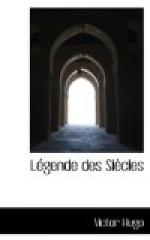L’un est l’Esprit de
vie, au vol d’aigle, aux yeux d’astre,
Qui rayonne, cree, aime, illumine, construit;
Et l’autre est l’araignee enorme de
la nuit.
In La Fin de Satan, of the days before the Flood,
Depuis longtemps l’azur perdait
ses purs rayons,
Et par instants semblait plein de hideuses
toiles
Ou l’araignee humaine avait pris
les etoiles.
And of Ignatius Loyola,
Sombre araignee a qui Dieu, pour
tisser sa toile,
Donnait des fils d’aurore et des rayons d’etoile.
Compare also:—
La toile d’araignee horrible
de Satan.
(La Trompette du Jugement.)
In other passages the spider is a type of the unpleasant.
La nuit, qui sert de fond au guet mysterieux
Du hibou promenant la rondeur de ses yeux,
Ainsi qu’a l’araignee ouvrant ses pales toiles.
(La Confiance du Marquis Fabrice.)
See also the passage from La Bouche d’Ombre, quoted in the notes to Le Crapaud.
BOOZ ENDORMI.
The subject of this exquisite little idyll is taken from the Book of Ruth, chapter iii, in which Ruth the Moabitess is described as lying at the feet of Boaz, the kinsman of her dead husband, Mahlon the Hebrew, in order that she might claim from him that he should marry her and continue the family of Mahlon, as provided by the law of Moses.
Judith. There was a Judith, daughter of Beer the Hittite, one of the wives of Esau (Gen. xxxvi. 34). Hugo may or may not have had this personage in his mind.
asphodele. Hugo is not always accurate in his local colouring. Asphodels are not found in Palestine.
Galgala, the form found in the Septuagint and Vulgate of the place-name Gilgal.
Les grelots des troupeaux. Here, again, Hugo is inaccurate. Sheep in Palestine do not have bells attached to them.
Jerimadeth. The name seems to be of Hugo’s own invention. It was a trick of the poet’s to make proper names suit the exigencies of rime, as in this instance, in which ‘Jerimadeth rimes with’ demandait.
AU LION D’ANDROCLES.
It is impossible to name the period to which Hugo is referring in this poem more precisely than by saying that it is the age of Rome under the Empire. As will be seen from the notes, the personages and events alluded to are not all contemporaneous. It was enough for Hugo that they were typical of the Roman decadence.
Trimalcion. The festival of Trimalcion is an episode in the Satyricon of Petronius Arbiter, the poem in which are described all the excesses of Roman luxury and debauchery. Petronius Arbiter lived in the time of Claudius.
Lesbie. Hugo is guilty of one of his inaccuracies here. Lesbia was the lady to whom the poems of Catullus (87-47 B.C.?) were addressed, while Delia, who is mentioned below in connexion with Catullus, was in reality the mistress of Tibullus (54 B.C.-19 A.D.).




